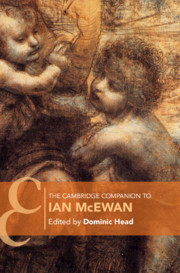Book contents
- The Cambridge Companion to Ian McEwan
- The Cambridge Companion to Ian McEwan
- Copyright page
- Contents
- Contributors
- Chronology
- Abbreviations
- Introduction
- 1 ‘Shock Lit’
- 2 Moral Dilemmas
- 3 Science and Climate Crisis
- 4 The Novel of Ideas
- 5 Cold War Fictions
- 6 The Construction of Childhood
- 7 The Public and the Private
- 8 Masculinities
- 9 The Novellas
- 10 Realist Legacies
- 11 Limited Modernism
- 12 Narrative Artifice
- Further Reading
- Index
- Cambridge Companions To…
8 - Masculinities
Published online by Cambridge University Press: 24 June 2019
- The Cambridge Companion to Ian McEwan
- The Cambridge Companion to Ian McEwan
- Copyright page
- Contents
- Contributors
- Chronology
- Abbreviations
- Introduction
- 1 ‘Shock Lit’
- 2 Moral Dilemmas
- 3 Science and Climate Crisis
- 4 The Novel of Ideas
- 5 Cold War Fictions
- 6 The Construction of Childhood
- 7 The Public and the Private
- 8 Masculinities
- 9 The Novellas
- 10 Realist Legacies
- 11 Limited Modernism
- 12 Narrative Artifice
- Further Reading
- Index
- Cambridge Companions To…
Summary
McEwan’s novels can be understood as stepping stones in a prolonged enquiry into the narrative formation of masculinities. From his earliest stories through to Nutshell the performance of male roles and the unreliability of gender demarcations are the subject of a metafictional process. Instabilities of genre echo and play out instabilities of gender. Joining in arguments which propose the constructed nature of gender, McEwan de-centres and re-maps conventional narratives of male development and triumph, overtly in The Child in Time, persistently, if less obviously, elsewhere. Recognized tropes of male progression towards mastery (competition, ordeal, violent confrontation) are tested against the promise and potential calamities of forms of play involving regression, or dressing up. Representation, relentlessly pursuing its subjects, merges into its sinister other – harassment and stalking. So narrative shades into forms of obsession, and such obsessions point back to the formation of damaged male subjectivities and yearning for patriarchal power.
Keywords
- Type
- Chapter
- Information
- The Cambridge Companion to Ian McEwan , pp. 120 - 134Publisher: Cambridge University PressPrint publication year: 2019
- 3
- Cited by

